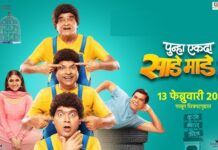Viacom18 Motion Pictures, KriArj Entertainment, Plan C Studios and Cape Of Good Films LLP’s Toilet – Ek Prem Katha (UA) is an unusual love story with a strong social message against open defecation and about the need to have in-house toilets or at least public toilets.
Keshav (Akshay Kumar) is in his thirties and lives in a small town, Mandgaon, in U.P. with his father and younger brother, Naru (Divyendu). Keshav is still unmarried because his father (Sudhir Pandey), a pandit, believes that a girl with two thumbs on her left hand would be the ideal match for him. He also gets Keshav married to a cow before a suitable girl can be found for him, in keeping with his superstitious beliefs. The moderately educated Keshav falls in love with Jaya (Bhumi Pednekar) and although she is a school topper, he woos her and ultimately gets married to her, hoodwinking his father into believing that her left hand has two thumbs.
All hell breaks loose when Jaya realises the morning after her wedding night that her matrimonial home does not have a toilet and that like the other ladies of the area, she too would have to defecate in the open before the break of dawn to escape being leered at. Since she comes from a family which has a toilet in the house, she is not at all comfortable relieving herself in the open. Keshav tries all the tricks in the book to convince her that he would find a solution to the problem but Jaya revolts and ultimately one day, she leaves Keshav and returns to her parental home. Since her father (Atul Srivastava) and uncle (Anupam Kher) are progressive in their outlooks, they support her stand. Her mother (Ayesha Raza Mishra) does ask her to compromise and return to her husband but Jaya is unrelenting.
Keshav tries to convince his father about allowing him to build a toilet in the house but the orthodox pandit will hear nothing about it. After being reported in the media, the issue of Keshav and Jaya’s separation reaches the panchayat before whom Keshav presents a case for having a community toilet in the town, but even that plea is turned down by the panchayat. It is then that Keshav announces that he would see to it that Mandgaon gets a toilet.
Exasperated, Keshav gets a toilet constructed in his house but his shocked father has it broken down. Keshav is now at his wits’ end as he sees no hope of Jaya returning to him. For, Jaya, with whom he has all along been in touch, has told him in no uncertain terms that no stop-gap arrangements would work for her and that she would return if and only if there was a toilet in the house. Soon, Jaya files for divorce. The media blows up the first divorce case of Mandgaon so much that it unearths the toilet scam involving crores of rupees which had been earmarked by the government for toilets and which had been usurped by the powers-that-be. Slowly but surely, the media coverage influences the thinking of the women in Mandgaon, who revolt against their husbands and demand toilets in their homes.
What happens thereafter? Does Keshav’s orthodox father let Keshav save his marriage by allowing a toilet to be constructed in-house? Does Jaya relent and return to her matrimonial home? Does Keshav succeed in convincing Jaya to withdraw her divorce plea? Does the government act?
Siddharth-Garima have written an unusual story in which a toilet becomes the bone of contention in the married life of a new couple. The story couldn’t be better timed as Prime Minister Narendra Modi’s Swachh Bharat Abhiyaan programme and anti-open-defecation campaign have got wide media coverage. Thanks to that, the audience is able to identify with the drama and the characters and empathise with Keshav and Jaya.
The duo’s screenplay is interesting and engaging as also novel. The first half is entertaining because of the humour. Whether it is the first meeting of Keshav and Jaya, or the former wooing the latter, or the interactions between Keshav and brother Naru, or between Keshav and his father, the screenplay unfolds in a way that it keeps the viewers involved. The second half has a lot of drama but it does get too long and boring at places, mainly because the arguments put forth by Keshav in support of building a toilet are similar almost everytime he puts his case forward, whether before his father or the panchayat or the bureaucrat or the ladies of the town, etc. The humour quotient reduces post-interval but, thankfully, it doesn’t disappear. Perhaps, the weakest link in the screenplay is that Jaya and Keshav hatch a plan by assuming that matters would move in a certain direction – and all this without having any control on how the government and the womenfolk in Mandgaon would react. In other words, the plan looks like a convenient twist in the tale, once the drama thereafter unfolds. Nevertheless, since the plan itself is one which puts society before self – which is what Keshav has advocated earlier – the audience is prepared to overlook the aberration.
Another drawback is that the audiences do not feel emotionally moved when Keshav makes all attempts to ensure that Jaya comes back to him. The exhilaration they should experience when Keshav puts society before self is also short-lived because the wow factor is missing in what happens when society and the government get involved. While the interval point is excellent, the post-interval part does not live up to it. The climax also lacks the thrill and excitement.
Siddharth-Garima’s dialogues are excellent but at places only. A film of this kind ought to have had clapworthy dialogues, full of punch-lines, in good measure.
Akshay Kumar does very well in the light scenes and raises several laughs. He is good in other scenes. The scene in which he breaks down when his father breaks the toilet does not quite appeal to the viewers. Bhumi Pednekar acts with confidence and impresses with a fine performance. Divyendu is excellent in the role of Naru. His comedy is very entertaining. Sudhir Pandey shines in the role of Keshav’s father. Atul Srivastava (as Jaya’s father), Ayesha Raza Mishra (as Jaya’s mother) and Anupam Kher (as Jaya’s uncle) lend very able support. Rajesh Sharma makes his presence well felt as Mathur. Shubha Khote (as Keshav’s grandmother), Mukesh Bhatt (as Rastogi), Kimti Anand (as Pradhan), Rati Shankar Tripathi (as sarpanch), Gunjan Malhotra (as Anu), Sachin Khedekar (in a special appearance as a film director) and Sana Khan (in a special appearance) are adequate.
Shree Narayan Singh’s direction is fairly good for a debut attempt. But he should’ve ensured more exciting moments in the second half which should’ve been crisper. Music (Vickey Prasad, Manas-Shikhar and Sachet-Parampara) is ordinary. The absence of hit songs is sorely felt. Lyrics (Siddharth-Garima) are weighty and meaningful. Song picturisations (by Rekha Chinni Prakash, Howard Rosemeyer and Ganesh Acharya) are ordinary. Surender Sodhi’s background music is okay. Anshuman Mahaley does a fine job of the camerawork. Abbas Ali Moghul’s action scenes are fair. Udai Prakash Singh’s production designing is appropriate. Shree Narayan Singh’s editing should’ve been sharper.
On the whole, Toilet – Ek Prem Katha is a fair entertainer which will do reasonably good business and keep its investors happy. It deserves tax-exemption.




























